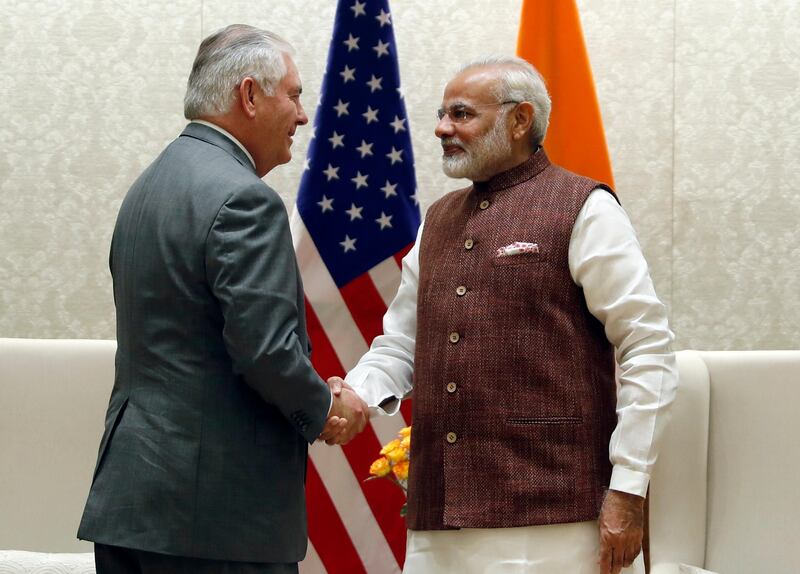India will keep its embassy in North Korea open despite US pressure to cut all ties with Pyongyang, telling secretary of state Rex Tillerson last week that this would be in Washington's interest.
Mr Tillerson, who made his first official visit to New Delhi on Tuesday, reiterated his administration’s request to India’s external affairs minister, Sushma Swaraj.
The US has urged all countries to break off relations with North Korea ever since Donald Trump assumed the presidency in January. This pressure has built through the 15 missile tests that the North Korean regime has conducted since February.
“The United States is considering, in addition to other options, stopping all trade with any country doing business with North Korea,” Mr Trump tweeted early in September.
Several countries have complied. Not long after Mr Trump’s tweet, Spain, Kuwait and Mexico expelled the North Korean ambassadors from the embassies in their capitals. Thailand and the Philippines suspended or cut back economic ties with Pyongyang.
But North Korea still has embassies in 48 national capitals, including Rome, Berlin, London and Stockholm, among other western cities.
After talks on Wednesday, Ms Swaraj said she and Mr Tillerson had “an open discussion” on the subject, and that India’s diplomatic channels with Pyongyang would stay open.
“I told Secretary Tillerson that embassies of some of your friendly countries should remain there, so that some channels of communication remain open,” she said. “Many times, you may have a need to talk ... A mutual dialogue may be required to resolve some issues. At least one embassy should be there from your friends. And I believe that he understood this.”
Mr Tillerson appeared to acknowledge Ms Swaraj’s argument in remarks on Friday. “I think they just indicated they think that office has a value as a conduit for communications,” he said. Asked whether he agreed with this, he said: “It could. It might.”
[ Read more: Mattis warns 'massive' response to North Korea nuclear weapon use ]
Mr Tillerson was happy, however, for India to continue its economic and diplomatic relationships with Iran - another country being targeted with increased US sanctions under Mr Trump.
“It is not our objective to harm the Iranian people nor is it our objective to interfere with legitimate business activities that are going on with other businesses, whether they be from Europe [or] India, or agreements that are in place or promote economic development and activity to the benefit of our friends and allies,” he said on Wednesday.
Ms Swaraj pointed out that both diplomatic and trade ties between New Delhi and Pyongyang were “minimal”.
The Indian embassy in the North Korean capital is staffed with just two diplomats. The North Korean embassy in New Delhi, however, has at least 30 diplomatic personnel.
India is North Korea’s largest trading partner after China, but the volume of trade has shrunk. Last year, trade between the two countries was valued at US$130 million (Dh477m). India exported machinery and cotton, while North Korea exported raw iron and steel.
This April, however, India decided to adhere more closely to United Nations sanctions over North Korea’s nuclear tests, and restricted exports to just food and medicine. As a result, the value of India-North Korea trade so far this year has dropped to roughly $11m.
Maintaining ties with both North Korea and the US has required a delicate balancing act by India. This year, for instance, India has decided to step up its criticism of the North Korean regime for its missile testing.
In June, after prime minister Narendra Modi met Mr Trump in Washington, their countries issued a joint statement condemning Pyongyang’s “continued provocations”. The leaders “pledged to work together to counter the DPRK's weapons of mass destruction programmes, including by holding accountable all parties that support these programmes”.
On September 3, India called it a matter of “deep concern” that Pyongyang had violated its international commitments with a nuclear test that morning. “India deplores the nuclear test,” the foreign ministry said.
At the same time, in the Chinese city of Xiamen last month, India endorsed a statement along with Brazil, Russia and China that “direct dialogue” was the only way to settle the tensions and nuclear concerns with North Korea.
Keeping diplomatic and trade links with North Korea alive may not amount to much by way of economic substance, Tridivesh Singh Maini, a professor at the Jindal School of International Affairs in New Delhi, told The National.
“Really, it’s a way to show independence — that you have a degree of autonomy, even from a country as important as the US,” Mr Maini said. “More than anything else, it has a symbolic value. That’s what matters.”





